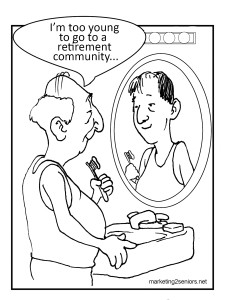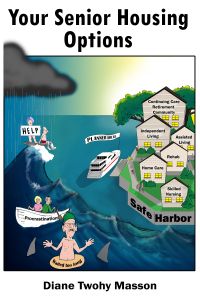
by Diane Masson | Nov 29, 2015

“I am not ready yet.” Illustration courtesy of, “Your Senior Housing Options” book.
Every single one of us knows a senior who is struggling in their home. Some seniors silently suffer and others have a whole network of support from family and friends.
- Daughters may call their mom once a day to inquire if her senior parent is okay OR no answer could mean they fell again and need help.
Result: Senior falls often lead to fractured hips, 911 calls, skilled nursing care with physically therapy and needing 24/7 care.
- A son may set his senior parent up with medications in a pillbox and then call two or three times a day to make sure his parent has taken them.
Result: This can be effective until the senior says, “What are these pills for? I don’t want to take them.” Most family members are not there in person twice a day to make sure the senior ingests the pills.
- Kind neighbors may make an extra plate of dinner every night and take it to their senior neighbor.
Result: Neighbors get frustrated and burned out, spending every single night away from their own family for one year or more. This type of support can’t go on and on.
- Daughters may spend every other Saturday cleaning mom’s house, grocery shopping and setting up her senior parent to survive for another two weeks.
Result: Even if the daughter lives two hours away, this type of help eventually turns into every Saturday. If the daughter works full time, it can never be daily help, then what?
What is the answer to a senior struggling to manage in their home?
Result: It’s time to talk turkey with a senior.
There are five typical results in having “The Talk” with a senior:
- Denial: “I am just fine living in my own home. I am not ready yet.”
- Shutting down: “I don’t want to discuss this.”
- Anger: “Why are you questioning my ability to be independent? Leave me alone.”
- Confusion: “Don’t you want to come see me everyday? I don’t understand.”
- Acceptance: “I understand that I have become a burden. Maybe it’s time to look at what my senior housing options could be. I am tired of being lonely. Will you help me look?”
In my 17-year senior housing career, my teams and I have helped thousands of seniors improve the quality of their life by making a planned move into an independent living, assisted living or Continuing Care Retirement Community. No one ever chooses memory care or skilled nursing, but those are options for many seniors (like my own in-laws) who waited too long and ended up in a health care crisis. Both my in-laws were hospitalized simultaneously in different hospitals and both their doctor’s told them they needed 24/7 care and could not return home. There was so much unnecessary suffering in my family and I don’t wish it on anyone. Such as my mother-in-law with dementia being given psychotropic medications (they don’t mix well). She has never been the same. Maybe my experiences can save you from a senior health care crisis?
Next week my blog will feature: 7 Tips to have “The Talk” with a Senior.
If this article struck a cord with you, please share it on social media to help others. If you have a friend or neighbor going through a struggle with a senior, let them know about next week’s blog.
Give the gift of knowledge: “Your Senior Housing Options” is an easy read with illustrations. It walks seniors and their adult children through the costs and pitfalls of navigating senior housing and includes the chapter on the “7 Deadly Sins of Searching for Senior Housing Options.”
News Flash: Diane Masson’s new interview on Generation Bold Radio will broadcast on Sunday, December 6th on the BizTalkRadio Network syndicated to 33 stations across the country.
Diane Masson is a senior living expert who has authored two 5-star rated books sold through Amazon. Her new book is an all-encompassing answer guide for seniors called, “Your Senior Housing Options,” designed to help seniors navigate choices quickly. The second book was written for senior living professionals called, Senior Housing Marketing – How To Increase Your Occupancy and Stay Full. Reach out to her through her website: Tips2Seniors.com and read the weekly blog.

by Diane Masson | Nov 22, 2015
 What should this senior couple do? They sold their home that they could not manage any more and decided to move into an independent rental retirement community in Orange County, California. The couple has an income of $3,600 a month, but their monthly rent is $5,200. (The senior couple’s rent includes three meals a day, wellness classes, entertainment, housekeeping, transportation and etc.) So $1,600 is taken out of their savings for rent on a monthly basis, plus they still have to pay for telephone, Internet, hair styling, car bills, pharmaceuticals, insurances and possibly even gifts and travel.
What should this senior couple do? They sold their home that they could not manage any more and decided to move into an independent rental retirement community in Orange County, California. The couple has an income of $3,600 a month, but their monthly rent is $5,200. (The senior couple’s rent includes three meals a day, wellness classes, entertainment, housekeeping, transportation and etc.) So $1,600 is taken out of their savings for rent on a monthly basis, plus they still have to pay for telephone, Internet, hair styling, car bills, pharmaceuticals, insurances and possibly even gifts and travel.
This senior couple is just one example. Their plight is not uncommon. Thousands of seniors are concerned that their meager savings are eroding too quickly.
What happens when a senior needs assisted living? How will they afford it? What if one of them has a debilitating stroke and needs long-term skilled nursing? On a nationwide basis, it averages $80,000 a year.
Are you aware that board and care homes in Orange County California recently went up $1,000 to $1,500 a month because of the increase to minimum wage? Board and cares are the least expensive options for seniors needing assisted living type care. How will seniors afford the care now?
Social security is not increasing for seniors in 2016.
Costs for independent living, assisted living, memory care and Continuing Care Retirement Communities will continue to rise as food, utilities and minimum wage goes up. Most of these retirement communities are saddled with a 50 to 100 million mortgage. The residents will be making those interest payments too.
Here’s a tip: Ask what the history of the year-over-year monthly fee increases have been. What will it be in 2016? Some predictions are 5 – 8 percent increases? What have you heard?
It is getting tougher for seniors to make decisions and plan for their future.
Here’s another tip: Sometimes that one time investment at a Continuing Care Retirement Community ends up costing you less in the long run. Figure out the break-even point for you. Many offer you support if you outlive your resources. Ask lots of questions and do not rely on verbal promises of senior living sales people.
News Flash: Diane Masson’s new interview on Generation Bold Radio will broadcast on Sunday, December 6th on the BizTalkRadio Network syndicated to 33 stations across the country.
Diane Masson is a senior living expert who has authored two 5-star rated books sold through Amazon. Her new book is an all-encompassing answer guide for seniors called, “Your Senior Housing Options,” designed to help seniors navigate choices quickly. The second book was written for senior living professionals called, Senior Housing Marketing – How To Increase Your Occupancy and Stay Full. Reach out to her through her website: Tips2Seniors.com and read the weekly blog.

by Diane Masson | Nov 15, 2015
 What’s better? What’s the senior housing spin?
What’s better? What’s the senior housing spin?
My mother moved into a not-for-profit Continuing Care Retirement Community. That’s where I started my senior housing career. I sold the not-for-profit status as better and more mission driven than the money grubby for-profits, because that was what all the not-for-profits said and did.
I was naive for three reasons, because later I learned:
- A non-profit board that did not understand seniors or senior housing made financial decisions for the entire senior living community.
- Most of the profits at the non-profit went towards other ministry work instead of being reinvesting back into the senior community.
- A resident was sexual abused by a non-profit staff member, even though every employee professed to be Christian.
Then my senior housing career switched to for-profit. It can be pretty dog-eat-dog aggressive at some companies. It really varies in the senior living industry if the resident is number one or the stockholders are the primary concern. So you better find out before you consider moving there or working there.
If a sales person can’t hit the required sales numbers, you are simply fired at some for-profits. Maybe that’s why so many sales people are impersonal and just want to know if you are ready now? If a senior is not ready now, the sales person has no interest in calling a senior back after they have toured. This is sad, because most seniors need to come back several times before making a decision to move. A relationship needs to be built.
At for-profit senior living communities, most financial decisions go towards the benefit of the stockholders. But there are some amazing administrators that love, adore and would walk on hot coals for their residents and staff. So resident centered communities can vary by location and not the owner in my opinion.
There are actually two types of for-profits: Those on the stock exchange and boutique communities that are run by families or attentive owners. I am lucky to work for a for-profit that is run by attentive owners. They have the heart of a not-for-profit and are completely resident centered and mission driven.
The communities I represent do something very unique for Continuing Care Retirement Communities. They offer a Guarantee of Care for life, if a resident outlives their resources. Every resident has the same offer, it is not limited to 5 or 10 residents on a good Samaritan fund or foundation.
Do you agree with my analogies or am I completely off base? How would you evaluate the differences?
Your Senior Housing Options,” has a simplistic title, but what’s inside this new book can save a you months of research time. Hear Diane Masson’s interview of how her mother and in-law’s faced the pivotal decision to plan ahead or wait until a crisis. Learn the pitfalls from transitioning from your home to senior housing. Understand what questions to ask, insider tips and dirty secrets revealed. For weekly tips join at: Www.Tips2Seniors.com
Diane Masson has worked in senior housing for 17 years and is the regional marketing director for two debt-free Continuing Care Retirement Communities in Southern CA (Freedom Village in Lake Forest and The Village in Hemet). Her first book “Senior Housing Marketing – How to Increase Your Occupancy and Stay Full,” is being utilized by senior housing professionals across the country. Both her first book and second book, “Your Senior Housing Options,” have a 5-star rating on Amazon.com.

by Diane Masson | Nov 8, 2015
 Yesterday, I had the pleasure of hearing Dr. Steven G. Potkin speak about a new Alzheimer’s study to prevent Alzheimer’s at Angel Stadium of Anaheim. Wow, I hope this study is successful.
Yesterday, I had the pleasure of hearing Dr. Steven G. Potkin speak about a new Alzheimer’s study to prevent Alzheimer’s at Angel Stadium of Anaheim. Wow, I hope this study is successful.
Dr. Potkin said that I could share all the information with you because he is currently seeking senior candidates who are 65 to 85 years of age (with normal memory) for this clinical study on Alzheimer’s disease (AD).
He is investigating a new drug intervention that may reduce the impact of a protein known as “amyloid” or “beta amyloid” forming plaques in the brain. Scientists believe that accumulation of amyloid in the brain may play a key role in the eventual development of AD-related memory loss.
Dr. Potkin is conducting the research study at the University of California Irvine (UCI) Medical Center in Orange, California. It is called the Anti-Amyloid Treatment in Asymptomatic Alzheimer’s study (the “A4” study for short) for seniors who may be at risk for memory loss due to AD.
A senior participant and his or her study partner need to be willing to be part of a three-year study. The study partner (must have frequent contact with the senior participant) would describe changes in the senior participant’s health to the study staff on a weekly basis.
There will be a PET scan at the initial screening meeting and at the conclusion of the three-year study to determine whether the senior participant has evidence of an elevated amyloid build-up. Senior participants will also receive monthly study drug infusions.
For more detailed information and the total compensation for completing the study, please contact Andrea Weideman with Dr. Steven G. Potkin’s Reseach Team at: 714-456-5697
My mother-in-law has Alzheimer’s and I pray this research can prevent future seniors from getting AD in the first place. Good luck to Dr. Potkin and the whole research team at UCI.
During my time with Dr. Potkin, he commended me for writing the book, “Your Senior Housing Options,” and said it is a much needed resource for seniors.
Diane Masson advocated for her mom who had dementia for nine years and her mother-in-law currently lives in a memory care community. Diane writes a Tips2Seniors blog every week and published a book to take the guess work out selecting senior housing before, during or after a health care crisis, “Your Senior Housing Options.” She has worked in senior housing for 17 years and her first book, “Senior Housing Marketing – How to Increase Your Occupancy and Stay Full,” is helping senior housing professionals on a nationwide basis.

by Diane Masson | Nov 1, 2015

You know who they once were better than anyone! Be the best advocate you can be!
Here are some tough statements that family members can hear at an Alzheimer’s or dementia care conference for their loved one (who might be residing in assisted living, memory care or skilled nursing care):
- She can’t direct her own care…
- Is regularly disoriented…
- Needs full help with bathing and dressing…
- She can become frustrated…
- Can be resistant to care…
- Does not always remember to use her walker…
It can proceed into an in-depth conversation about the ability of your loved one’s communication:
- She is not very verbal…
- She has improved in the last four months from not speaking at all (because she was still coming off of the psychotropic medications) to being a little more verbal.
- The staff has to use phrases or questions that are seven words or less to create less confusion for her.
- The staffs’ goal is to elicit a “yes” or “no” response, so she can make choices.
Then a group discussion can proceed about who she can still recognize and if she can still call anyone by name (this is tough one):
- Does she recognize you?
- She thinks her daughter is her sister.
How much food is or is not consumed?
Our family has experienced witnessing continual weight loss of my mother-in-law for 10 months. She is eating 50% of her food, but can pop out of her chair and start wandering sporadically while dining. She walks almost continually. The staff have problem solved this by feeding her in the country kitchen instead of the dining room to increase her food intake.
What should you ask in a care conference? Don’t be intimidated; no one knows your loved one better than you. Be his or her advocate to the best of your ability.
- Find out exactly what medication they take and why. Sometimes they were given a medication like a psychotropic in the hospital and no one is paying attention to the fact it is not necessary anymore.
- How much exercise or movement do they experience? Staying mobile is important.
- Inquire about live entertainment. Your loved one may be refusing to go to live entertainment and you know they love music. The only reason they may be refusing is because they can’t HEAR the caregiver asking them to go. Maybe the caregiver needs to speak up or…
- Ask about music therapy. It can be very affective for dementia and Alzheimer’s. If they tried it once and it was refused, try again. Every day is a new day. Seniors with dementia (such as my mom) can be more receptive and oriented in the morning.
- How much food do they eat? Maybe they are not eating because they have lost teeth (this happened to my mom)? Food adjustments can be made.
Is there anyone else out there dealing with a parent who has dementia? It is not easy. What tips can you share?
Diane Masson advocated for her mom who had dementia for nine years and her mother-in-law currently lives in a memory care community. Diane writes a Tips2Seniors blog every week and published a book to take the guess work out selecting senior housing before, during or after a health care crisis, “Your Senior Housing Options.” She has worked in senior housing for 17 years and her first book, “Senior Housing Marketing – How to Increase Your Occupancy and Stay Full,” is helping senior housing professionals on a nationwide basis.





